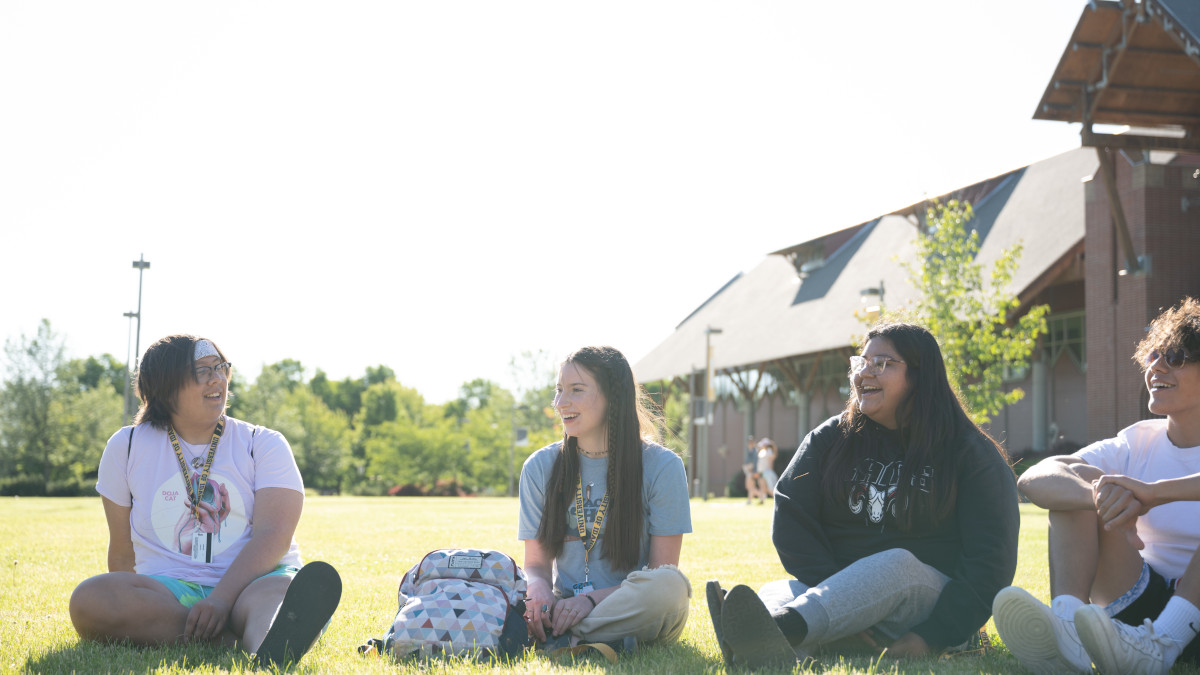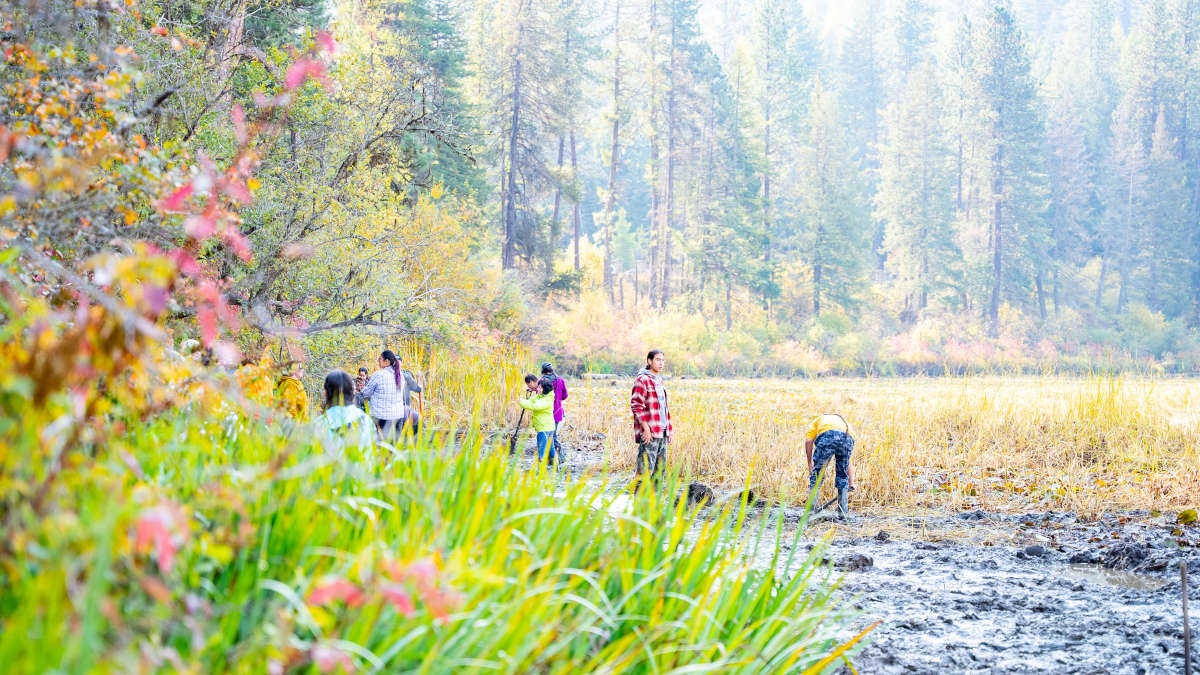Circling Back on STEM
Team Seeks Indigenous Input in Public Schools
There is an idea in the education world that STEM is STEM, no matter who studies it. University of Idaho’s Philip Stevens and his team are challenging that notion.
Stevens and his team received two grants from the National Science Foundation in 2022 to (a) work with local and regional tribal nations to establish collaborative relationships in K-12 public schools to discuss STEM learning and (b) to use that information to build new spaces to support more Indigenous students in studying STEM learning in college.
Alongside Stevens are Vanessa Anthony-Stevens, associate professor in curriculum and instruction in College of Education, Health and Human Sciences (CEHHS) and principal investigator of the Indigenous Knowledge for Effective Education Program (IKEEP) and Karla Eitel, research professor in College of Natural Resources (CNR) and director of the McCall Field Campus and McCall Outdoor Science School (MOSS).
“At a lot of universities, there is a pre-supposed idea about what STEM learning is, including what the goals and outcomes are,” Stevens said. “We need to call attention to cultural perspectives instead of starting off with a baseline of ‘all humans do X, therefore that’s a given.’ The evidence from our lived experiences and human records tell us that knowledge is much more diverse than presented in STEM classrooms.”

Cultivating Relationships
The K-12 program, called Cultivating Relationships, is being built and delivered in collaboration with tribal nations. The $3 million grant from the National Science Foundation, through its Discovery Research K-12 program, will help researchers test the model in four regions of the Western U.S. and tribal nations starting in summer 2023.
The U of I team, including Chris Hamilton, assistant professor in entomology, plant pathology and nematology in College of Agricultural & Life Sciences, Shanny Spang Gion, visiting tribal scholar in CNR and Brant Miller, professor of science education in CEHHS, hopes the program will result in curriculum that supports more Indigenous youth viewing STEM fields as a place where their experience matters and their knowledge is vital for global wellbeing.
Past research has shown STEM lessons ignore Indigenous principles that shaped thousands of years of sustainable land and water relationships and management practices.
“Teachers rarely come into K-12 classrooms with an understanding of Indigenous peoples, their nations or a sense of how important their relationship to the land is,” Anthony-Stevens said. “To address this gap, it is important to share this information with teachers to apply in the classroom.”
Sixty-four K-12 teachers from three regional Native American tribes (Nez Perce, Coeur d’Alene and Shoshone-Bannock), and one tribe in Arizona (San Carlos Apache) will enroll in a 12-month, 15-credit teacher certification program for two years.
Participating teachers will be immersed in experiential learning of Indigenous approaches to scientific fields and land management. The teachers will then use that knowledge to create STEM teaching lessons with U of I faculty. Research on the certificate program aims to determine promising practices for braiding Indigenous knowledge and STEM content into contemporary teaching methods.
Philip Stevens
Associate Professor of Anthropology, Director of American Indian Studies

CIRCLES
The second part of the project, called Cultivating Indigenous Research Communities for Leadership in Education (CIRCLES Alliance), focuses on STEM teaching and learning in college and training for careers in the workforce.
Through the $2 million NSF grant, the U of I team will help develop Indigenous-based STEM education activities for all public school levels through graduate studies, expand the network to tribes and communities serving Native students in Idaho, Montana, New Mexico, North Dakota, South Dakota and Wyoming, and design faculty development models to support more Native participation in teaching.
“Indigenous people do not come to STEM as empty vessels. Indigenous worldviews and ways of being in relationship with world have helped Indigenous people to live in this place we call the Americas for millennia,” said Stevens, director of American Indian Studies and associate professor in anthropology in College of Letters, Arts and Social Sciences. “To understand the complexities of our planet and universe, we need complex, sophisticated and diverse thinkers and communities.”
Teachers rarely come into K-12 classrooms with an understanding of Indigenous peoples, their nations or a sense of how important their relationship to the land is. To address this gap, it is important to share this information with teachers to apply in the classroom.Vanessa Anthony-Stevens, U of I curriculum and instruction associate professor
The U of I project will fund graduate education for 10 students seeking STEM education degrees and help prepare future Indigenous teachers who hope to work in K-12 schools and in spaces of community learning. Researchers seek to understand how furthering critical conversations about the interdisciplinary nature of knowledge and our relationships with environments contribute to higher education re-thinking curriculum and faculty awareness of Native peoples and lands.
Changing the conditions of higher education, and subsequently K-12 systems, needs to include voices from tribal members, according to Stevens. Increasing Native representations in STEM practice and education will result in more Native youth entering the fields.

Formed in 2020 with support from NSF’s Established Program to Stimulate Competitive Research and INCLUDES programs, the CIRCLES Alliance, through research and collaboration with tribal communities, aims to inform educational institutions and the NSF in Indigenous cultural understanding and humility and to shift approaches toward Indigenous education.
CIRCLES Alliance will partner with the Idaho Tribal Department of Education, Tribal colleges and universities, and the Idaho Indian Education Committee to share outreach and student recruitment material.
The Cultivating Relationships project was funded by National Science Foundation under award 2201148. The total project funding is $2,999,999, of which 100% is the federal share, and an intended total funding of $2,999,999 over a multi-year period.
The CIRCLES Alliance project was funded by National Science Foundation under award 2217344. The total project funding is $9,995,872, of which 100% is the federal share, and an intended total funding of $9,995,872, over a 5-year period.
Vanessa Anthony-Stevens, Ph.D.
Associate Professor of Social and Cultural Studies

Article by David Jackson, University Communications and Marketing.
Photos provided by University of Idaho Visual Productions.
Published in April 2023.








